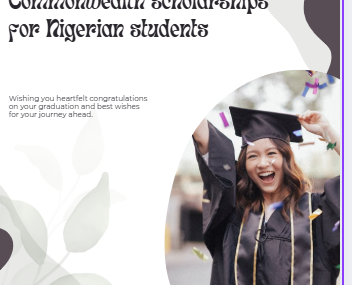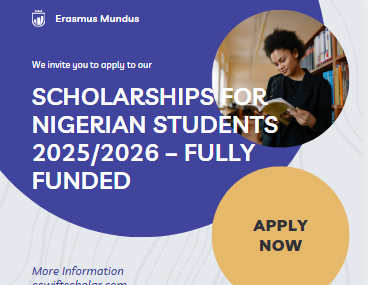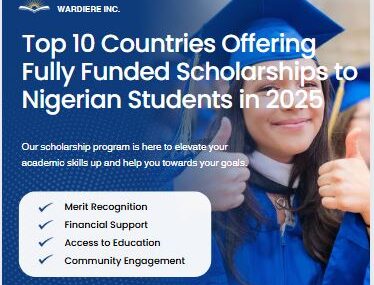International Scholarships for Nigerian Students 2025/2026
Introduction
In today’s highly competitive and knowledge-driven world, education remains a powerful tool for empowerment and transformation. However, the high cost of tertiary education—especially for international programs—can be a significant hurdle for Nigerian students. Fortunately, numerous international scholarships are available to support Nigerian students who wish to pursue undergraduate, master’s, or PhD degrees abroad.
As the 2025/2026 academic session approaches, several governments, institutions, organizations, and private foundations are opening doors for Nigerians to access fully funded or partially funded international scholarships. This guide provides in-depth information about these opportunities, how to apply, eligibility requirements, and real testimonials from previous Nigerian beneficiaries.
Why Nigerian Students Should Consider International Scholarships
-
Global Quality Education: International universities often provide better infrastructure, teaching quality, and research opportunities.
-
Exposure to New Cultures: Studying abroad gives students a broader perspective of the world.
-
Networking and Career Opportunities: International exposure helps students build valuable academic and professional networks.
-
Financial Relief: Many scholarships cover tuition, accommodation, travel, and even living stipends.
-
Migration Pathways: Some countries allow international students to apply for post-study work visas or permanent residence.
International Scholarships for Nigerian Students 2025/2026
Top International Scholarships for Nigerians in 2025
1. Chevening Scholarships (UK)
-
Level: Postgraduate (Master’s)
-
Coverage: Full tuition, living allowance, flight, and visa costs
-
Eligibility:
-
Be a Nigerian citizen
-
Hold a bachelor’s degree (2:1 or higher)
-
At least two years of work experience
-
2. Commonwealth Scholarships
-
Level: Master’s and PhD
-
Funding: Fully funded by the UK government
-
Eligibility:
-
Academic excellence
-
Financial need
-
Contribution to Nigeria’s development
-
3. DAAD Scholarships (Germany)
-
Level: Master’s and PhD
-
Funding: Full or partial scholarships for development-related courses
-
Perk: Some programs are offered without IELTS
4. Erasmus Mundus Joint Masters
-
Level: Joint Master’s Degree
-
Funding: Tuition, travel, insurance, and monthly stipend
-
Eligibility:
-
Strong academic record
-
Mobility across European universities
-
5. Fulbright Foreign Student Program (USA)
-
Level: Graduate studies (Master’s and PhD)
-
Funding: Fully funded by the U.S. government
-
Requirement:
-
Strong academic background
-
Leadership potential
-
6. Eiffel Scholarship Program (France)
-
Level: Master’s and PhD
-
Funding: Monthly stipend, travel, insurance
-
Eligibility:
-
Young Nigerians under 30 (Master’s), 35 (PhD)
-
Academic merit and motivation
-
7. Chinese Government Scholarships (CSC)
-
Level: Undergraduate, Master’s, and PhD
-
Funding: Fully funded including tuition, accommodation, and stipend
-
Application Channel: Through Chinese embassy or university
8. Mastercard Foundation Scholars Program
-
Level: Undergraduate and Master’s
-
Universities: University of Edinburgh, UBC (Canada), AUB (Lebanon), among others
-
Focus: Leadership and development impact
General Eligibility Criteria
Though each scholarship has its specific requirements, the general eligibility criteria include:
-
Nigerian citizenship
-
Academic excellence (minimum second class upper)
-
Valid international passport
-
Statement of purpose or personal statement
-
Letters of recommendation
-
Research proposal (for PhD)
-
English language proficiency (IELTS/TOEFL – although some waive this)
-
Community involvement or leadership roles
How to Apply for International Scholarships
-
Research Early: Begin researching at least 6–12 months in advance.
-
Choose Suitable Scholarships: Focus on those matching your course, level, and background.
-
Prepare Documents:
-
Academic transcripts and certificates
-
Personal statement
-
CV or Resume
-
Reference letters
-
Language test scores (if required)
-
-
Apply Through the Official Portal: Never pay agents or use third-party sites.
-
Prepare for Interviews: Some scholarships include an interview or written assessment.
Tips to Win a Scholarship as a Nigerian Student
-
Start Early: Application windows are time-bound.
-
Personalize Your Statement: Tell your unique story.
-
Seek Mentorship: Reach out to past winners on LinkedIn or social platforms.
-
Avoid Common Errors: Spelling mistakes, generic essays, or late submissions.
-
Don’t Give Up: Rejection is not the end—many successful applicants applied more than once.
International Scholarships for Nigerian Students 2025/2026
Real Testimonies from Nigerian Students
Faith O. – Commonwealth Scholar, UK
“I never imagined studying abroad was possible until I came across the Commonwealth Master’s Scholarship. With the right guidance and perseverance, I got accepted into the University of Leeds. Everything was paid for!”
Ugochukwu E. – Erasmus Mundus Scholar
“The Erasmus Mundus experience has transformed my life. I got the chance to study in Spain and Germany, meet people from around the world, and now I have a job in Europe.”
Amina A. – DAAD Scholar
“The DAAD scholarship opened doors to world-class research. I was scared at first because I didn’t have IELTS, but I applied through a program that waived it and still succeeded.”
Frequently Asked Questions (FAQs)
1. Can I get a scholarship without IELTS?
Yes. Many scholarships—especially in Germany, France, China, and even some UK universities—waive IELTS if you studied in English or take an internal test.
2. What GPA do I need for international scholarships?
Generally, a minimum of 3.0/5.0 or Second Class Upper (2:1) is required. However, some accept 2:2 if you have strong experience.
3. Are these scholarships for only postgraduate studies?
No. While most are postgraduate-focused, some scholarships also cover undergraduate studies (e.g., Mastercard Foundation, Chinese Government, and some EU-based programs).
4. Is there an age limit?
Some scholarships specify age limits (e.g., under 30 or 35). Always check the specific scholarship guidelines.
5. How do I know a scholarship is legitimate?
Only apply via official university or government websites. Avoid agents or sites requesting money.
Conclusion
Studying abroad is no longer a dream too far-fetched for Nigerian students. With the numerous international scholarships available for the 2025 academic session, Nigerian students have real opportunities to access world-class education without financial burden.
All it takes is determination, preparation, and the right guidance. Whether you’re aiming for a Master’s in the UK, a PhD in Germany, or an undergraduate degree in China, there’s a scholarship waiting for you.
Stay updated, start early, and let your academic goals take flight beyond borders.






